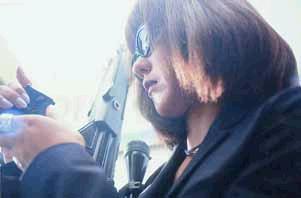

Last year, Lies, Chunhyang, and Nowhere to Hide made it here from Korean cinemas. The three very different films provided a glimpse of Korean films, which almost never make it here. Shiri is the latest import from Korea, an ultra-violent action film that proves that Korean filmmakers can make movies that are just as bloody and vapid as Americans can. Writer/director Kang Je-Gyu (Gingko Bed) actually borrows much from the John Woo school of filmmaking, from gun-in-the-face standoffs, to hyperactive action sequences. Also in the vein of Hong Kong cinema is a muddled plot. The first thing that Kang needs to learn that action sequences do not take the place of plot. The first fifteen minutes of Shiri foreshadows the rest of the story. It has a promising start, then quickly flashes forward years at a time, confusing viewers by providing a huge amount of plot without adequate explanation.
The bulk of the story concerns Ryu (Han Suk-kyu, The Contact, Christmas in August) and Lee (Song Kang-ho, The Foul King, The Quiet Family), two Korean special agents. They are tracking Hee, a North Korean assassin who went into hiding eight years ago. Recent deaths seem to indicate that she is back in action. There is a diplomatic undercurrent behind Shiri; the reunification of North and South Korea. To foster a sense of unity, the two Koreas are forming a joint soccer team for the 2002 World Cup. Leaders of both countries are going to watch their first game as a team. A rogue group of North Korean special agents (including Hee) is determined to sabotage these efforts. Despite the best efforts of Ryu and Lee, Hee and her allies evade them at every turn. It's as if there is a spy in their midst, leaking information to Hee. This is bad for Lee, who is preparing for his marriage to Hyun (Kim Yoon-jin, Gingko Bed 2).
Basically, Shiri is too long. It feels like it has about five endings. Just when somebody thinks the movie is (and should) be over, it goes on to something else. Because he refuses to fully develop the story, there are large gaps that fill slowly. A full sense of the situation involving the characters does not occur until well into the film. By the end of the movie, there is a clear plot afoot, but it seems that Kang is toying with the audience by taking so long to gather all the threads together. There are also a number of things that Kang probably considered 'twists,' yet are predictable. Kang eschews the political aspects of the story in favor of sequences where thousands of bullets fly but people rarely hit anybody. The level of blood is also extremely high, with some graphic death scenes. Aside from a sometimes overzealous use of the shaky-cam technique, Kang has a good eye for filming action sequences. There may be too many of them, but he shoots them well, providing a high level of adrenaline and tension. Now, if people only cared or understood what is going on.